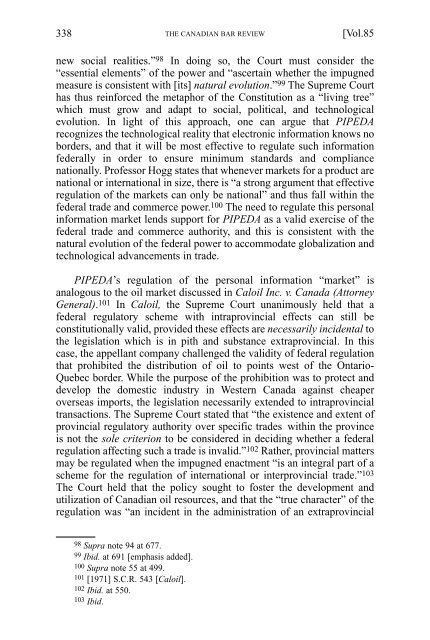PIPEDA: A CONSTITUTIONAL ANALYSIS - Goodmans
PIPEDA: A CONSTITUTIONAL ANALYSIS - Goodmans
PIPEDA: A CONSTITUTIONAL ANALYSIS - Goodmans
Create successful ePaper yourself
Turn your PDF publications into a flip-book with our unique Google optimized e-Paper software.
338 THE CANADIAN BAR REVIEW<br />
[Vol.85<br />
new social realities.” 98 In doing so, the Court must consider the<br />
“essential elements” of the power and “ascertain whether the impugned<br />
measure is consistent with [its] natural evolution.” 99 The Supreme Court<br />
has thus reinforced the metaphor of the Constitution as a “living tree”<br />
which must grow and adapt to social, political, and technological<br />
evolution. In light of this approach, one can argue that <strong>PIPEDA</strong><br />
recognizes the technological reality that electronic information knows no<br />
borders, and that it will be most effective to regulate such information<br />
federally in order to ensure minimum standards and compliance<br />
nationally. Professor Hogg states that whenever markets for a product are<br />
national or international in size, there is “a strong argument that effective<br />
regulation of the markets can only be national” and thus fall within the<br />
federal trade and commerce power. 100 The need to regulate this personal<br />
information market lends support for <strong>PIPEDA</strong> as a valid exercise of the<br />
federal trade and commerce authority, and this is consistent with the<br />
natural evolution of the federal power to accommodate globalization and<br />
technological advancements in trade.<br />
<strong>PIPEDA</strong>’s regulation of the personal information “market” is<br />
analogous to the oil market discussed in Caloil Inc. v. Canada (Attorney<br />
General). 101 In Caloil, the Supreme Court unanimously held that a<br />
federal regulatory scheme with intraprovincial effects can still be<br />
constitutionally valid, provided these effects are necessarily incidental to<br />
the legislation which is in pith and substance extraprovincial. In this<br />
case, the appellant company challenged the validity of federal regulation<br />
that prohibited the distribution of oil to points west of the Ontario-<br />
Quebec border. While the purpose of the prohibition was to protect and<br />
develop the domestic industry in Western Canada against cheaper<br />
overseas imports, the legislation necessarily extended to intraprovincial<br />
transactions. The Supreme Court stated that “the existence and extent of<br />
provincial regulatory authority over specific trades within the province<br />
is not the sole criterion to be considered in deciding whether a federal<br />
regulation affecting such a trade is invalid.” 102 Rather, provincial matters<br />
may be regulated when the impugned enactment “is an integral part of a<br />
scheme for the regulation of international or interprovincial trade.” 103<br />
The Court held that the policy sought to foster the development and<br />
utilization of Canadian oil resources, and that the “true character” of the<br />
regulation was “an incident in the administration of an extraprovincial<br />
98 Supra note 94 at 677.<br />
99 Ibid. at 691 [emphasis added].<br />
100 Supra note 55 at 499.<br />
101 [1971] S.C.R. 543 [Caloil].<br />
102 Ibid. at 550.<br />
103 Ibid.
















